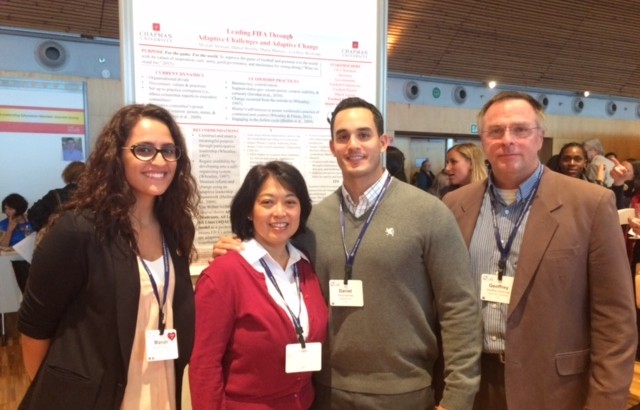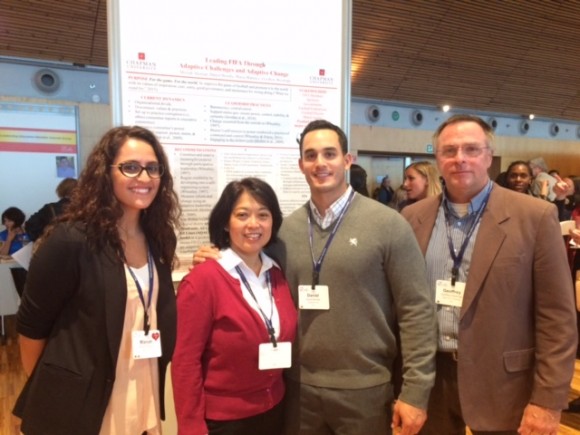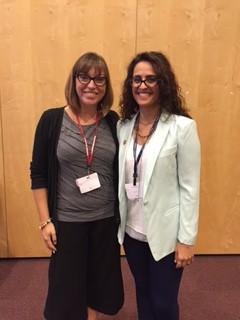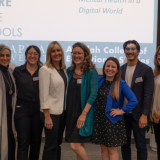
PhD students and Faculty Attend Leadership Conference in Barcelona “Leading Across Borders and Generations”
November 10, 2015
This year, four PhD students and assistant professor Whitney McIntyre Miller attended the International Leadership Association’s Global Conference in Barcelona, Spain. The students participated in the Annual Student Case Competition and were assigned a

compelling case study about Fédération Internationale de Football Association (FIFA). The Chapman team included Danny Bonilla, Maria Martinez, Geoffery Westropp, and myself. Although we did not advance to the finalists’ presentation round, it was a great experience for us to showcase our poster and demonstrate knowledge on leadership theory and practice by providing our analysis of FIFA’s leadership crisis utilizing Meg Wheatley’s work on leadership and complex systems, Ron Heifetz’s adaptive leadership, and Ken Wilber’s integral theory. Despite the jetlag and an exhausting 2-hour poster presentations session, we enjoyed our discussions with the conference’s attendees and the competition’s judges.
Our second day at the conference was jam-packed with presentations. We started off the morning with a presentation in the form of a panel discussion on
Global Leadership Competencies Across Sectors
. The panel included Dr. McIntyre Miller, Maria Martinez, Danny Bonilla, Geoffery Westropp (filling in for Ed Rodriguez), and myself as the panel’s chair.
After the morning session, a few of us had presentations to give. For example, I gave an individual presentation on
Promoting and Fostering Global Leadership Education in Saudi Arabia
, Maria Martinez facilitated an interactive roundtable discussion on
The Role of Global Education Leaders in Developing Quality Homestay Programs,
and Dr. McIntyre Miller co-facilitated an interactive roundtable discussion on
Exploring Learning and Development Outcomes Associated with Experiential Philanthropy
.
On our the third day of the conference, Dr. McIntyre Miller and I were among a team of presenters in a panel discussion titled
Peace Leadership: Expanding the Borders of Peace
. The discussion focused on peace leadership within ILA’s member interest groups (business leadership, leadership development, leadership education, leadership scholarship, public leadership, and youth leadership). The discussion highlighted elements within the field of leadership that inform and contribute to peace leadership, and considered peace leadership as intertwined with leadership theory and practice across sectors, disciplines, and approaches. The panel included Theresa Ricke-Kiely, Nikol Hopman, Bernice Ledbetter, and Erich Schellhammer as presenters, as well as Jean C. Lipman-Blumen as the panel’s chair.

This was my first experience (and hopefully not my last) presenting at an international conference. I had the opportunity to network with attendees and presenters at the conference, and attended a networking dinner hosted by ILA’s youth leadership member interest group. Though it was a four-day event, it was an unforgettable experience in scholarly engagement that I highly recommend to my fellow peers in the leadership studies emphasis. In addition, I highly recommend the conference to Chapman University’s graduate students in the M.A. leadership program and encourage them to consider attending the conference whereby they are provided with an opportunity to expand their knowledge base in the field of leadership, network with professionals and scholars in the field of education, register for and compete in the annual student case competition and challenge themselves to out-do the Ph.D. students and win the competition J, or even present a compelling topic that reflects on and contributes to ILA’s global conference theme “The Dynamics of Inclusive Leadership” to be held next year in Atlanta, Georgia.

